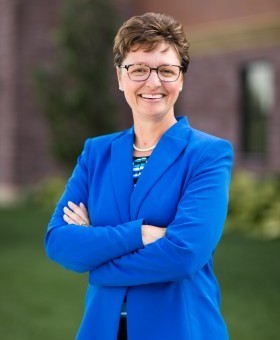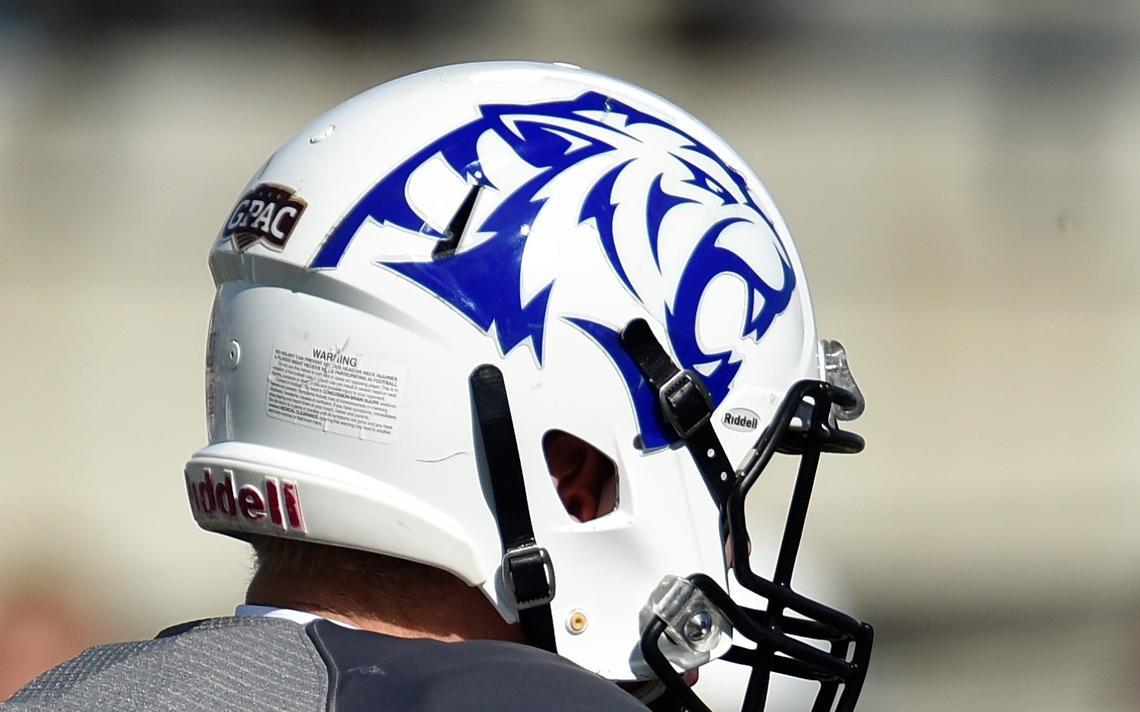
The role of the university amid controversy

Dr. Amy Novak. DWU photo.
One might have hoped that the return of college athletics—particularly when so many conferences have cancelled their fall seasons—would serve as a welcome balm for communities exhausted by the pandemic, widespread economic challenges, and a summer of protest that has unfolded across the nation. But, as we all know, we live in unprecedented times.
As the start of the fall seasons in football, soccer, volleyball, and cross country have inched closer, the inquiries, phone calls, and emails have increased. Many of these inquiries pose the same question, “Are you going to let your student athletes kneel during the national anthem?” Often these communications are not merely inquiries; they are also statements communicating a person’s intent to not support the university should Dakota Wesleyan student athletes “be allowed” to kneel during the national anthem.
These communications fill me with sadness, not because of the support that the university may forgo in this regard, but because the individuals threatening to withdraw their support fundamentally misunderstand the central purpose of the university. Dakota Wesleyan student-athletes are, after all, student-athletes. An athletic scholarship may help make their education more accessible financially, but the ultimate goal is for them to become engaged citizens and successful professionals, not professional athletes.
The situation has called to mind arguments that Cardinal John Henry Newman makes in his classic text The Idea of a University. Newman argued famously, and against many of his contemporaries, that the pursuit of knowledge represented an end in itself. He wrote that a university education “gives a man a clear conscious view of his own opinions and judgments, a truth in developing them, an eloquence in expressing them and a force in urging them.” Critically however, Newman fully recognized that the journey to this point was rarely straight and was almost always messy.
Some of the angry messages I have received have come from those who have served in the military. They claim that kneeling shows disrespect for “the very freedom they signed up to defend.” As a military spouse, I deeply value the sacrifice made by our military, but I also recognize that peaceful protest, far from showing disrespect for freedom, represents a fundamental expression of that very freedom. Anyone who has taken an oath in the military knows that the servicemember swears to “defend the Constitution of the United States against all enemies foreign and domestic.” The Constitution allows for peaceful protest. The Constitution safeguards the right of Americans to form opinions and to express them in a civil manner. The Constitution does not pertain only to some Americans, members of a particular party, a particular faith, or a particular group. It pertains to “We the People.” The story of America is an ever-evolving more perfect union that must allow for a multiplicity of voices, or else it betrays the very principles upon which the nation stands.

Photo by Mitchell Republic.
It’s a messy business, allowing for multiple voices and beliefs. It’s a complicated process to discern what one embraces and what one rejects. As citizens, we can’t be content to hide in a corner and hope that all this noise, all this tension, all the political polarization of the moment will somehow just blow away, and someone else will figure it out, and tell me what to think, and tell me what to do.
The university does not shrink from the margins, the gray, the complexities, the conflicts over values and virtues, the multiplicity of faiths and opinions. We are not in the business of making widgets. We are not in the business of creating a unified body of believers. The university engages the development of human beings, in all their beautiful complexity.
The question of whether or not a student-athlete should kneel during the national anthem is precisely the sort of question that a university should be preparing its students to answer, thoughtfully, and for themselves. As the fall sport season commences in many places across the nation, there will be white athletes who kneel. There will be black athletes who remain standing. These decisions are personal decisions and the intent of these decisions is neither to disrespect one’s teammates nor the members of the local community. All student athletes, whether kneeling or standing are seeking to discern and articulate their civic role and their civic voice, during exceedingly challenging times, in the unfolding story of America.
The university is a place where students seek, in part, to understand their role as citizens, to seek to discern their relationship to the greater good, and to cultivate the courage, purpose, and principles to guide them as they assume roles in the larger community. This is a part of what’s best about America. I will support all our students seeking to find their civic roles and voices, whether they kneel or stand.
Where does The United Methodist Chruch stand?
The United Methodist Church proclaims the value of each person as a unique child of God and commits itself to the healing and wholeness of all persons.
The United Methodist Church recognizes that the sin of racism has been destructive to its unity throughout its history. Racism continues to cause painful division and marginalization.
The United Methodist Church shall confront and seek to eliminate racism, whether in organizations or in individuals, in every facet of its life and in society at large.
The United Methodist Church shall work collaboratively with others to address concerns that threaten the cause of racial justice at all times and in all places.
from The Book of Discipline of The United Methodist Church 2016, paragraph 5
Pray, connect, show up, act as United Methodists stand against racism.